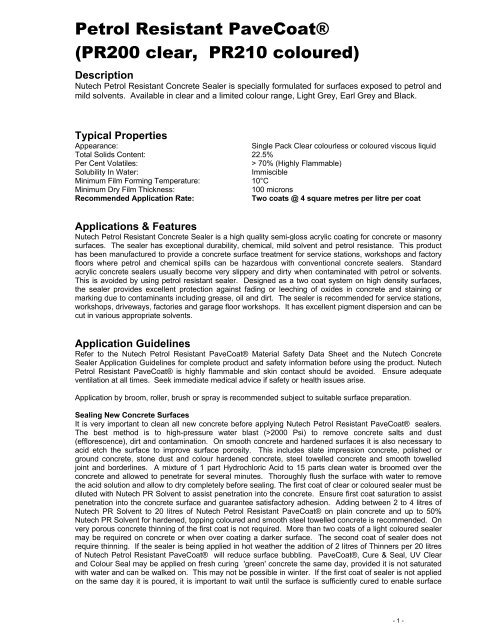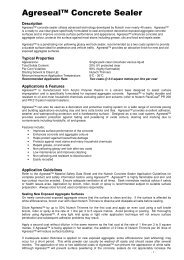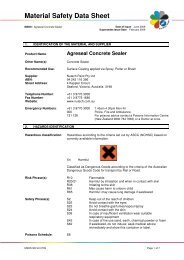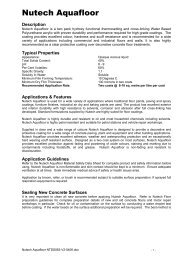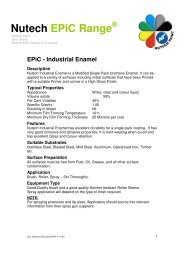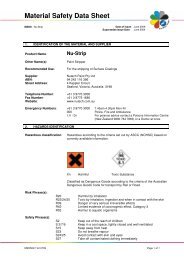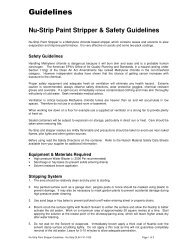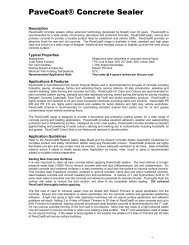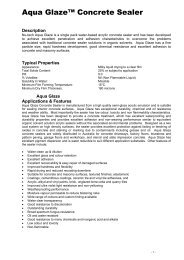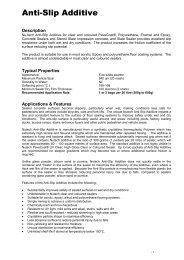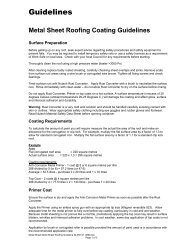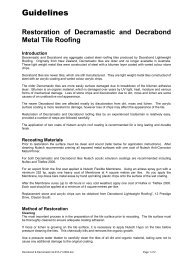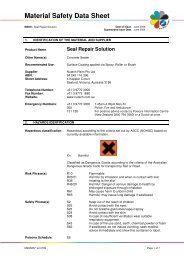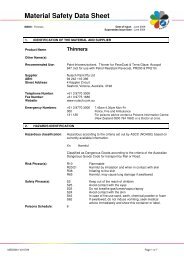Nutech Petrol Resistanct Pavecoat Data Sheet
Nutech Petrol Resistanct Pavecoat Data Sheet
Nutech Petrol Resistanct Pavecoat Data Sheet
Create successful ePaper yourself
Turn your PDF publications into a flip-book with our unique Google optimized e-Paper software.
<strong>Petrol</strong> Resistant PaveCoat®<br />
(PR200 clear, PR210 coloured)<br />
Description<br />
<strong>Nutech</strong> <strong>Petrol</strong> Resistant Concrete Sealer is specially formulated for surfaces exposed to petrol and<br />
mild solvents. Available in clear and a limited colour range, Light Grey, Earl Grey and Black.<br />
Typical Properties<br />
Appearance: Single Pack Clear colourless or coloured viscous liquid<br />
Total Solids Content: 22.5%<br />
Per Cent Volatiles: > 70% (Highly Flammable)<br />
Solubility In Water: Immiscible<br />
Minimum Film Forming Temperature: 10°C<br />
Minimum Dry Film Thickness: 100 microns<br />
Recommended Application Rate: Two coats @ 4 square metres per litre per coat<br />
Applications & Features<br />
<strong>Nutech</strong> <strong>Petrol</strong> Resistant Concrete Sealer is a high quality semi-gloss acrylic coating for concrete or masonry<br />
surfaces. The sealer has exceptional durability, chemical, mild solvent and petrol resistance. This product<br />
has been manufactured to provide a concrete surface treatment for service stations, workshops and factory<br />
floors where petrol and chemical spills can be hazardous with conventional concrete sealers. Standard<br />
acrylic concrete sealers usually become very slippery and dirty when contaminated with petrol or solvents.<br />
This is avoided by using petrol resistant sealer. Designed as a two coat system on high density surfaces,<br />
the sealer provides excellent protection against fading or leeching of oxides in concrete and staining or<br />
marking due to contaminants including grease, oil and dirt. The sealer is recommended for service stations,<br />
workshops, driveways, factories and garage floor workshops. It has excellent pigment dispersion and can be<br />
cut in various appropriate solvents.<br />
Application Guidelines<br />
Refer to the <strong>Nutech</strong> <strong>Petrol</strong> Resistant PaveCoat® Material Safety <strong>Data</strong> <strong>Sheet</strong> and the <strong>Nutech</strong> Concrete<br />
Sealer Application Guidelines for complete product and safety information before using the product. <strong>Nutech</strong><br />
<strong>Petrol</strong> Resistant PaveCoat® is highly flammable and skin contact should be avoided. Ensure adequate<br />
ventilation at all times. Seek immediate medical advice if safety or health issues arise.<br />
Application by broom, roller, brush or spray is recommended subject to suitable surface preparation.<br />
Sealing New Concrete Surfaces<br />
It is very important to clean all new concrete before applying <strong>Nutech</strong> <strong>Petrol</strong> Resistant PaveCoat® sealers.<br />
The best method is to high-pressure water blast (>2000 Psi) to remove concrete salts and dust<br />
(efflorescence), dirt and contamination. On smooth concrete and hardened surfaces it is also necessary to<br />
acid etch the surface to improve surface porosity. This includes slate impression concrete, polished or<br />
ground concrete, stone dust and colour hardened concrete, steel towelled concrete and smooth towelled<br />
joint and borderlines. A mixture of 1 part Hydrochloric Acid to 15 parts clean water is broomed over the<br />
concrete and allowed to penetrate for several minutes. Thoroughly flush the surface with water to remove<br />
the acid solution and allow to dry completely before sealing. The first coat of clear or coloured sealer must be<br />
diluted with <strong>Nutech</strong> PR Solvent to assist penetration into the concrete. Ensure first coat saturation to assist<br />
penetration into the concrete surface and guarantee satisfactory adhesion. Adding between 2 to 4 litres of<br />
<strong>Nutech</strong> PR Solvent to 20 litres of <strong>Nutech</strong> <strong>Petrol</strong> Resistant PaveCoat® on plain concrete and up to 50%<br />
<strong>Nutech</strong> PR Solvent for hardened, topping coloured and smooth steel towelled concrete is recommended. On<br />
very porous concrete thinning of the first coat is not required. More than two coats of a light coloured sealer<br />
may be required on concrete or when over coating a darker surface. The second coat of sealer does not<br />
require thinning. If the sealer is being applied in hot weather the addition of 2 litres of Thinners per 20 litres<br />
of <strong>Nutech</strong> <strong>Petrol</strong> Resistant PaveCoat® will reduce surface bubbling. PaveCoat®, Cure & Seal, UV Clear<br />
and Colour Seal may be applied on fresh curing 'green' concrete the same day, provided it is not saturated<br />
with water and can be walked on. This may not be possible in winter. If the first coat of sealer is not applied<br />
on the same day it is poured, it is important to wait until the surface is sufficiently cured to enable surface<br />
- 1 -
<strong>Petrol</strong> Resistant PaveCoat®<br />
(PR200 clear, PR210 coloured)<br />
preparation as recommended above. In winter concrete is usually cold and wet on the surface for at least 2-<br />
3 days and sometimes for up to one week. Sealing of this concrete is not recommended until the surface<br />
has started to whiten indicating adequate curing. If inadequate sealer thickness is applied on new concrete,<br />
some efflorescence (salt whitening) may occur for a short period. This white powder can usually be washed<br />
off easily and should cease after several months. The application of one or two additional coats of sealer<br />
can prevent the appearance of white salts. Although <strong>Nutech</strong> <strong>Petrol</strong> Resistant PaveCoat® will prevent<br />
surface powdering of the concrete, sealers do not appreciably increase the hardness of the concrete surface.<br />
Soft or damaged concrete should not be sealed with <strong>Nutech</strong> <strong>Petrol</strong> Resistant PaveCoat® without special<br />
surface treatment to stabilise and harden the concrete.<br />
Sealing & Resealing Old Concrete<br />
It is important to remove all grease, oil, food, contamination and flaking paint before sealing or re-sealing.<br />
<strong>Nutech</strong> Grease Magic should be used to remove oil and grease. Soaking heavy stains with Grease Magic<br />
before high pressure water cleaning is recommended. All cleaners, chewing gum, food, silicon and acrylic<br />
paint should be completely removed from the concrete before <strong>Nutech</strong> <strong>Petrol</strong> Resistant PaveCoat® is applied.<br />
Thorough testing is recommended before applying <strong>Nutech</strong> <strong>Petrol</strong> Resistant PaveCoat® over a previously<br />
sealed surface to ensure compatibility. Before applying <strong>Nutech</strong> <strong>Petrol</strong> Resistant PaveCoat® do not acid etch<br />
the concrete if there is an existing sealer or coating on the surface because coating delamination will occur.<br />
Very old, hard sealer or problem and delaminating sealer surfaces should be thoroughly scrubbed with<br />
<strong>Nutech</strong> Seal Repair Solution before re-sealing (refer SRS application instructions). It is recommended that a<br />
small area is tested using this method and left to weather for at least 4-6 weeks. If the new sealer on the test<br />
area fails, stripping the old sealer, acid etching and high pressure water cleaning will be required before<br />
applying new coats of <strong>Nutech</strong> <strong>Petrol</strong> Resistant PaveCoat®.<br />
Slip Hazard<br />
Sealing of smooth and sloping concrete surfaces will reduce pedestrian and vehicle safety. Adding one or<br />
two 300gram packets of <strong>Nutech</strong> Anti-Slip Additive per 20 litres in the final coat of <strong>Nutech</strong> <strong>Petrol</strong> Resistant<br />
PaveCoat® will reduce slipping and improve pedestrian safety. <strong>Nutech</strong> Anti-Slip Additive is not adequate on<br />
steep concrete therefore <strong>Nutech</strong> <strong>Petrol</strong> Resistant PaveCoat® is not recommended for sealing very steep and<br />
smooth concrete. Refer to your <strong>Nutech</strong> specialist for alternative coating recommendations on steep smooth<br />
surfaces.<br />
Curing Time<br />
Curing time is dependant on temperature. At 25°C <strong>Nutech</strong> <strong>Petrol</strong> Resistant PaveCoat® will touch dry in 30<br />
minutes. Allow a minimum of 1 hour between coats in warm weather and longer in cool weather. In cold<br />
weather allow additional time. Full curing is not achieved for up to one week. Avoid parking vehicles for<br />
several days in cold weather and 3-4 days in very hot weather. Do not park vehicles with hot tyres on newly<br />
applied <strong>Nutech</strong> <strong>Petrol</strong> Resistant PaveCoat® for at least five days.<br />
Application Warnings<br />
Do not apply <strong>Nutech</strong> <strong>Petrol</strong> Resistant PaveCoat® late in the day as the risk of surface damage caused by<br />
dew and condensation increases. Sealer affected by moisture loses gloss and may appear milky. <strong>Nutech</strong><br />
<strong>Petrol</strong> Resistant PaveCoat® contains flammable solvents and suitable safety precautions must be taken<br />
during handling and application. Ensure <strong>Nutech</strong> PR Solvent is used for thinning etc, not standard <strong>Nutech</strong><br />
Thinners. Ensure adequate ventilation if applying in enclosed spaces. Avoid contact with naked flames,<br />
sparks, pilot lights and other sources of ignition. Avoid contact with eyes and skin. Read ‘Safety Directions’<br />
on container.<br />
Refer to <strong>Nutech</strong> Material Safety <strong>Data</strong> <strong>Sheet</strong> for additional safety and user information.<br />
Important Note<br />
The information given on this data sheet is based on many years experience and is correct to the best of our knowledge. However<br />
since the use of our product, surface conditions, weather and a number of other factors are completely beyond our control, we can only<br />
be responsible for the quality of our product at the time of dispatch. For more information please contact our Company. As this<br />
information is of a general nature, we cannot assume any responsibility in individual cases.<br />
<strong>Petrol</strong> Resistant PaveCoat NTDS032-V1-0802.doc - 2 -


